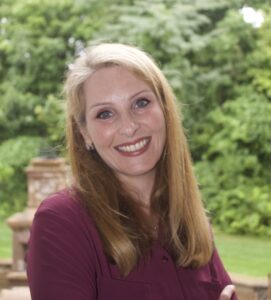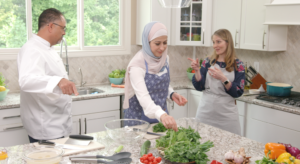 The Arabic Studies Program is delighted to announce Hiba Alalami as a new associate faculty member. Ms. Alalami, a PhD candidate in the School of Liberal Arts’ American Studies program, is a distinguished Arab American and Muslim American non-profit leader. Currently the research and development director at Indiana League of Women Voters, she served previously as the first executive director of the Indiana Muslim Advocacy Network and also as fund development coordinator at the Islamic Society of North America. Ms. Alalami played a key role in the Arab Indianapolis community history project and is a volunteer board member of the Indiana chapter of American Arab Anti-Discrimination Committee. Her teaching areas will include Arab media, Arabic literature in translation, Middle East cultures, Arab histories, Islam in America, and Arab Americans in Indiana.
The Arabic Studies Program is delighted to announce Hiba Alalami as a new associate faculty member. Ms. Alalami, a PhD candidate in the School of Liberal Arts’ American Studies program, is a distinguished Arab American and Muslim American non-profit leader. Currently the research and development director at Indiana League of Women Voters, she served previously as the first executive director of the Indiana Muslim Advocacy Network and also as fund development coordinator at the Islamic Society of North America. Ms. Alalami played a key role in the Arab Indianapolis community history project and is a volunteer board member of the Indiana chapter of American Arab Anti-Discrimination Committee. Her teaching areas will include Arab media, Arabic literature in translation, Middle East cultures, Arab histories, Islam in America, and Arab Americans in Indiana.
Arabic Studies program director Edward Curtis sat down with Ms. Alalami to talk with her about her new role:
Edward Curtis: How do you feel about becoming an associate faculty member? What are you looking forward to?
Hiba Alalami: As an alum of O’Neill School of Public and Environmental Affairs and an American Studies Ph.D. candidate (expected Spring 2025), my affiliation with IU Indianapolis has been formative. Joining the university as an associate faculty is an incredibly exciting opportunity for me! I am honored to be able to give back to the institution that has shaped my academic journey while inspiring students to embrace diverse perspectives. I am eager to contribute to the School of Liberal Arts’ commitment to inclusivity and excellence by fostering meaningful conversations and cultivating a deeper understanding of Arab and Muslim cultures in the classroom. I look forward to wearing the teaching hat and delivering knowledge that speaks to my ethnicity and religious background.
Edward Curtis: How do your community connections help you with your teaching?
Hiba Alalami: The community connections that I cultivated through social networking and my long-standing service to the Arab and Muslim communities in Central Indiana bring valuable insights to my teaching. While we intend to immerse the students in Arabic culture, media, and literature, as well as Islamic history and scholarship, it is equally important to bring them back home and make connections with local communities. Inviting community members to speak about their lived experiences is one way to provide students with community-engaged learning. Whether you are part of the community or have never interacted with an Arab or Muslim community member, such opportunities can be valuable to all students, fostering understanding and combating racism, discrimination, and Islamophobia, ultimately contributing to stronger, more inclusive communities.

In addition to volunteering as the treasurer of the Arab Indianapolis Foundation and leading multiple community dialogues, Hiba Alalami also appeared in the project’s documentary, “Arab Indianapolis: A Hidden History.” She is pictured here with Edward Curtis and Samia Alajlouni.
Edward Curtis: Why do you think Arabic and Islamic studies is important?
Hiba Alalami: Islam is the second largest religion in the world. There are 1.8 billion Muslims around the globe, with 315 million living in the Middle East and North Africa region. Muslim and Christian Arabs have grown roots here in Indiana, as demonstrated by the recent scholarship about Arab Indianapolis history and the vibrant Muslim community in Central Indiana. Having an Arabic and Islamic Studies program in the School of Liberal Arts is a testament to the university’s commitment to uplift historically marginalized communities and provide an international perspective and culturally enriching experiences that equip students with the tools to engage thoughtfully in a globalized world.
Edward Curtis: Anything else you want to share?
Hiba Alalami: I would like to highlight the fact that six students who commit to a minor in Arabic and Islamic Studies are eligible to receive $4,000 each in scholarships. Those scholarships are funded by community members, which underscores the overwhelming support that this newly expanded program has received. This level of generosity and enthusiasm reflects their deep commitment to fostering cross-cultural understanding and academic engagement. By supporting the students in their pursuit of a minor in Arabic and Islamic Studies, these scholarships not only ease the financial barriers but also empower the next generation to build bridges of knowledge, empathy, and mutual respect.


